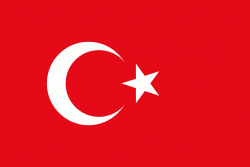Kars Province (Kars)
In ancient times, Kars (Կարս) was part of the province of Ararat in the Kingdom of Armenia. The first known people were the followers of Vanand (Վանանդ), for whom Kars was their main settlement and fortress. In 928, Kars became the capital of Bagratid Armenia. In 968, the capital of Armenia was moved to Ani, but Kars remained the capital of the feudal principality of Vanand.
The Seljuks quickly relinquished direct control over Kars and it became a small emirate whose territory corresponded closely to that of Vanand, and which bordered the similarly created but larger Shaddadid emirate centered at Ani. The Kars emirate was a vassal of the Saltukids in Erzurum, whose forces were effective in opposing Georgian attempts at seizing Kars. Later on, in 1207, Georgian and Armenian forces commanded by David Soslan and brothers Ivane and Zakare Zakarian-Mkhargrzeli captured Kars after a long siege. It was a part of Zakarid Armenia, principality under rule of Zakarians–Mkhargrdzeli, vassals of Bagrationi dynasty of Georgia. George IV son of Tamar, was appointed as a viceroy of Kars. It was conquered in 1242 by the Mongols; was regained by Georgian Kingdom during the reign of George V the Brilliant (1314–1346) and remained as part of the Kingdom before its disintegration, which then passed into the hands of Georgian Atabegs belonging to the House of Jaqeli. During the rule of the Persian Empire and the Ottoman Empire, the fortress of Kars, located in what was then the eastern part of the city, fell into disrepair. However, as Kars was within a border region its defensive structures were often renewed, and they continued to advance to such a degree, that in the 19th century Kars was well known around the world as a castle.
As a result of the Russo-Turkish War of 1877 to 1878, the province of Kars was incorporated into the Russian Empire as part of the militarily administered Kars Oblast and remained so until 1918. It was seen as a border province of a Russian Empire which was seeking to expand yet further by the conquest of more territory belonging to the Ottoman Empire. The period from 1878 to 1918 was marked in the province of Kars by the settlement by the Russian authorities of a very heterogeneous mix of Christian populations, including Armenians, Caucasus Greeks, Russians, Georgians, and even smaller numbers from other Christian communities hitherto with little or no historical links to the region, such as ethnic Germans, Poles, Estonians, Lithuanians, and Russian sectarian communities such as Molokans and Doukhobors. Many from the non-Russian Christian Orthodox communities (Georgians, Caucasus Greeks, and the minority of Armenians who were Lessor Orthodox) had themselves fought in or collaborated with the Russian Imperial army to capture Kars province from the Muslim Ottomans. They saw this as a means of fulfilling their own ambitions to recapture Christian territory on the back of the Russian imperial enterprise.
Map - Kars Province (Kars)
Map
Country - Turkey
 |
|
| Flag of Turkey | |
One of the world's earliest permanently settled regions, present-day Turkey was home to important Neolithic sites like Göbekli Tepe, and was inhabited by ancient civilisations including the Hattians, Hittites, Anatolian peoples, Mycenaean Greeks, Persians and others. Following the conquests of Alexander the Great which started the Hellenistic period, most of the ancient regions in modern Turkey were culturally Hellenised, which continued during the Byzantine era. The Seljuk Turks began migrating in the 11th century, and the Sultanate of Rum ruled Anatolia until the Mongol invasion in 1243, when it disintegrated into small Turkish principalities. Beginning in the late 13th century, the Ottomans united the principalities and conquered the Balkans, and the Turkification of Anatolia increased during the Ottoman period. After Mehmed II conquered Constantinople (Istanbul) in 1453, Ottoman expansion continued under Selim I. During the reign of Suleiman the Magnificent, the Ottoman Empire became a global power. From the late 18th century onwards, the empire's power declined with a gradual loss of territories. Mahmud II started a period of modernisation in the early 19th century. The Young Turk Revolution of 1908 restricted the authority of the Sultan and restored the Ottoman Parliament after a 30-year suspension, ushering the empire into a multi-party period. The 1913 coup d'état put the country under the control of the Three Pashas, who facilitated the Empire's entry into World War I as part of the Central Powers in 1914. During the war, the Ottoman government committed genocides against its Armenian, Greek and Assyrian subjects. After its defeat in the war, the Ottoman Empire was partitioned.
Currency / Language
| ISO | Currency | Symbol | Significant figures |
|---|---|---|---|
| TRY | Turkish lira | ₺ | 2 |
| ISO | Language |
|---|---|
| AV | Avar language |
| AZ | Azerbaijani language |
| KU | Kurdish language |
| TR | Turkish language |
















